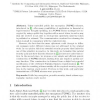1054 search results - page 115 / 211 » Secret Communication with Feedback |
FC
2005
Springer
15 years 3 months ago
2005
Springer
We define and instantiate a cryptographic scheme called “private counters”, which can be used in applications such as preferential voting to express and update preferences (or...
ICICS
2005
Springer
15 years 3 months ago
2005
Springer
The concept of concurrent signatures allows two entities to produce two signatures in such a way that, the signer of each signature is ambiguous from a third party’s point of vie...
ISPEC
2005
Springer
15 years 3 months ago
2005
Springer
Token-controlled public key encryption (TCPKE) schemes, introduced in [1], offer many possibilities of application in financial or legal scenarios. Roughly speaking, in a TCPKE s...
TCC
2005
Springer
15 years 3 months ago
2005
Springer
Adaptively-secure encryption schemes ensure secrecy even in the presence of an adversary who can corrupt parties in an adaptive manner based on public keys, ciphertexts, and secret...
ICALP
2001
Springer
15 years 2 months ago
2001
Springer
Abstract. We present the first private information retrieval (PIR) scheme which is both, deterministically correct and has poly-logarithmic communication complexity. Our PIR proto...

